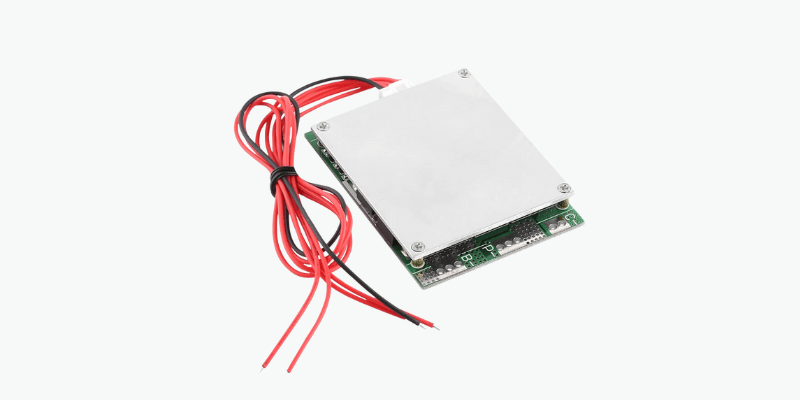Although lithium-ion batteries have the highest energy density, they can be vulnerable to conditions that may damage the battery pack. That’s why we need a battery management system to help prevent such damaging conditions.
Definition
A battery management system (BMS) is an electronic circuit that monitors and regulates the charging and discharging of a rechargeable battery.
It ensures the battery operates within safety limits, which is critical for the battery’s performance and longevity.
Types of Battery Management Systems
Battery management systems span a range from simple to complex, incorporating various technologies to care for batteries. These systems can be categorized by their topology – how they are installed and operate across the battery pack’s cells or modules.
Centralized BMS Architecture
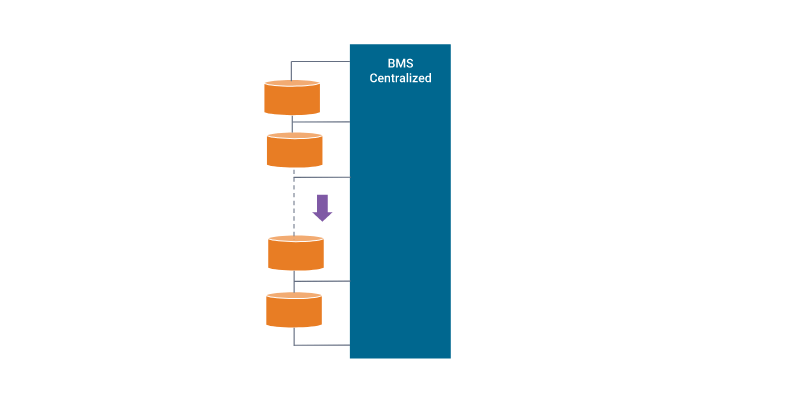
A centralized BMS in a battery pack offers advantages, such as being more compact and economical.
However, it also has drawbacks.
With all batteries directly connected, the BMS requires numerous ports, leading to complex wiring and cabling in large battery pack. This complicates troubleshooting and maintenance.
Modular BMS Topology
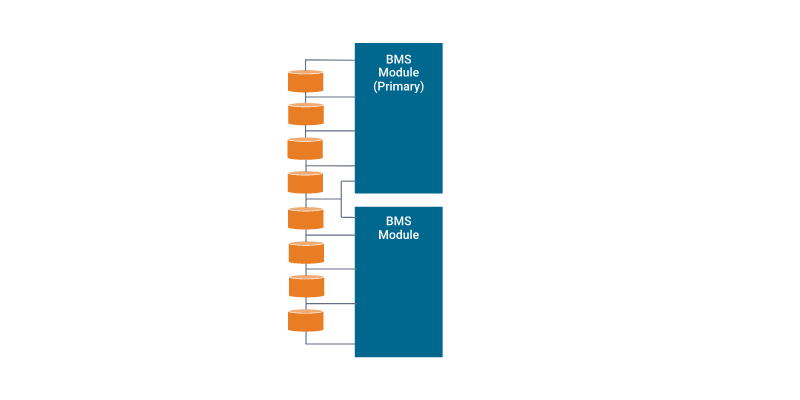
For this type of BMS, the system is divided into duplicated modules, each connected to an assigned portion of the battery stack.
A primary BMS module may oversee submodules, monitoring their status and communicating with other equipment. This duplicated modularity simplifies troubleshooting, maintenance, and expansion to larger battery packs.
However, this approach slightly increases overall costs and may result in duplicated unused functionality, depending on the application.
Primary/Subordinate BMS
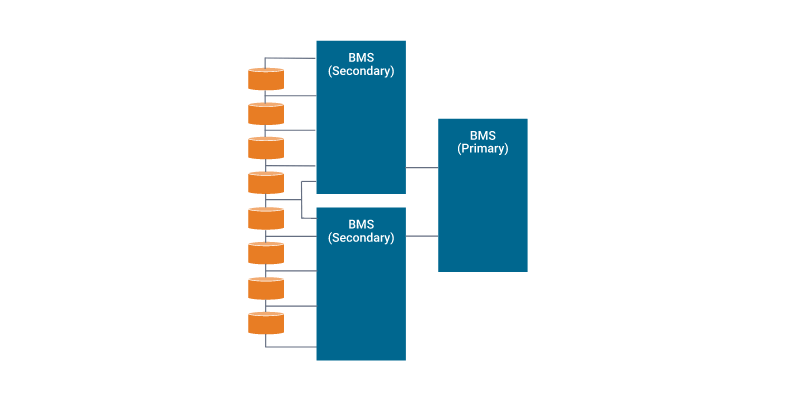
Similar to modular topology, in this case, slaves primarily relay measurement information, while the master handles computation, control, and external communication.
The slave functionality is simpler, potentially reducing costs due to less overhead and fewer unused features, as with modular types.
Distributed BMS Architecture
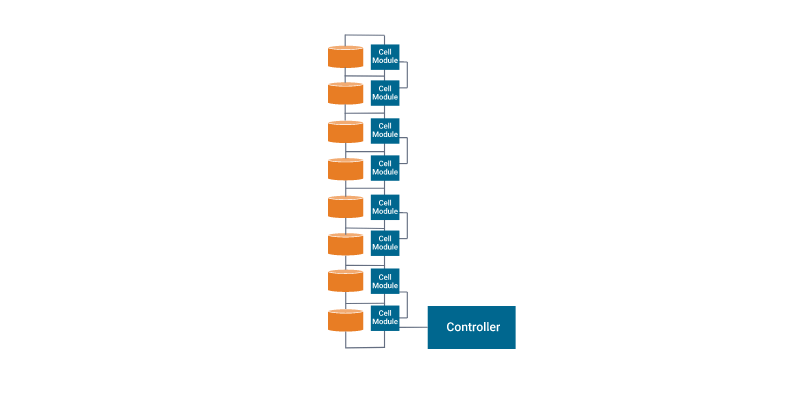
Distributed BMS designs differ from other topologies.
They incorporate all electronic hardware on a control board placed directly on the monitored cell or module. This reduces cabling to a few sensor and communication wires between BMS modules. Each BMS is more self-contained, handling computations and communications as needed.
However, this integrated form can make troubleshooting and maintenance more difficult, as the BMS resides inside a shielded module.
Costs are also higher due to the increased number of BMS units in the battery pack.
What is the Function of a Battery Management System?
The battery management system monitors and manages the battery cell parameters, measuring current, voltage, and temperature based on system demands. It balances cells and calculates the battery’s State of Charge (SoC) and State of Health (SoH).
The BMS prevents over-voltage, over-temperature, and other risks by controlling charging and discharging processes. It is essential for ensuring both battery and user safety.
The communication function transmits signals between internal BMS components and external devices. A BMS can display data on dashboards or human-machine interfaces (HMIs). Connections with chargers, either integrated or separate, can be wired or wireless.
Why a Battery Management System is Important for Lithium-ion Batteries
Lithium-ion batteries have a flammable liquid electrolyte, so they must operate optimally and within safety limits to prevent fires.
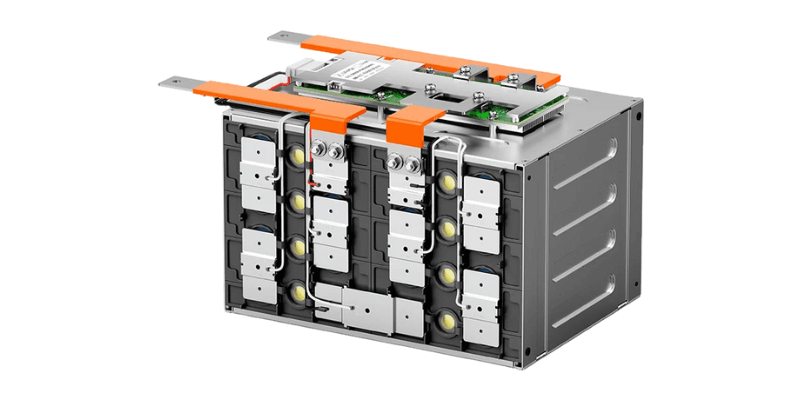
How Does a Battery Management System Work?
The battery management system, connected to sensors, monitors each cell’s voltage, current, and temperature. It analyzes the data to ensure the cells operate within set parameters and takes action to resolve issues.
The BMS controls the cooling system to lower battery pack temperature if cells overheat. It also balances the cells by transferring energy between them to maintain equal voltages.
The BMS logs data to assess the energy entering and exiting the battery pack and overall health. Lithium-ion batteries use this data to detect when the battery is drained and then shut down. This is why they don’t exhibit the same dying signs as lead-acid batteries, but simply turn off.
What are the Benefits of a Battery Management System?
BMS benefits include:
- Functional safety especially for large lithium-ion battery packs, preventing fires and damage
- Extending battery lifespan and reliability by managing cells within safe operating limits
- Optimizing battery performance and range through cell balancing
- Providing diagnostics, data collection, and communication on battery status
- Reducing overall costs and warranty claims by protecting the battery system
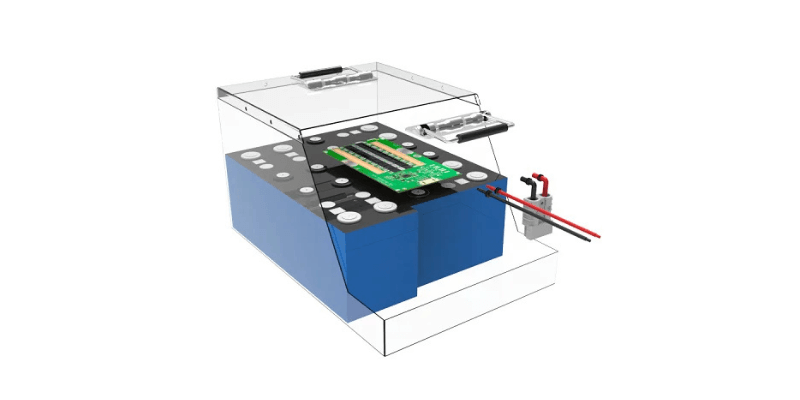
Protections Offered By a Battery Management System
The protections of a battery management system is as below:
Under and Over-Voltage
The BMS protects lithium-ion battery cells from damage caused by overcharging (cell voltage getting too high) or over-discharging (cell voltage getting too low). It prevents under and over-voltage situations that could harm the battery.
Temperature Extremes
Lithium-ion battery safety and stability depend on temperature control. Exceeding critical limits can cause thermal runaway and unextinguishable fires.
The BMS monitors temperature, controls cooling fans, and can shut down cells to maintain proper conditions.
Protection from Shorts
Thermal runaway can also occur due to internal and external shorts.
Therefore, protection from shorts is a vital part of a battery management system.
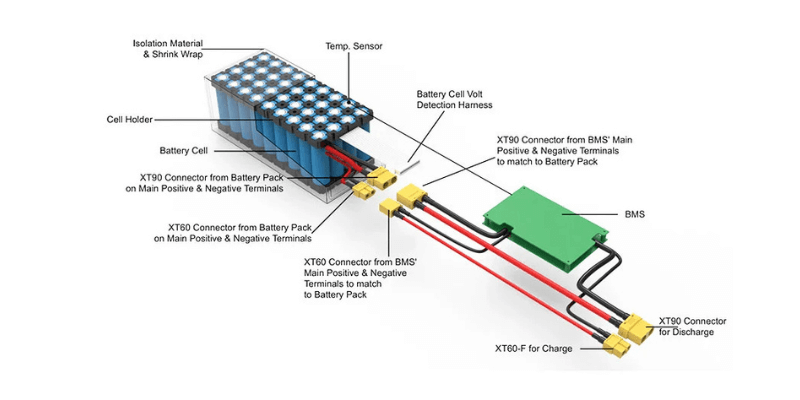
Holo Battery Built-In Battery Management System
Holo Battery offers custom BMS options to protect against common battery failure causes like short circuits, high currents, temperature extremes, and voltage issues.
Our BMS come in various sizes to fit your setup, and they optimize battery life and provide performance data.
Whether powering small devices or large energy systems, we provide reliable, user-friendly BMS solutions.
Conclusion
Lithium-ion batteries offer many benefits, but require monitoring, management, and balancing to ensure safety and optimal longevity. The battery management system is key, keeping batteries operating safely and efficiently so you can use them with confidence.
Related Article:


